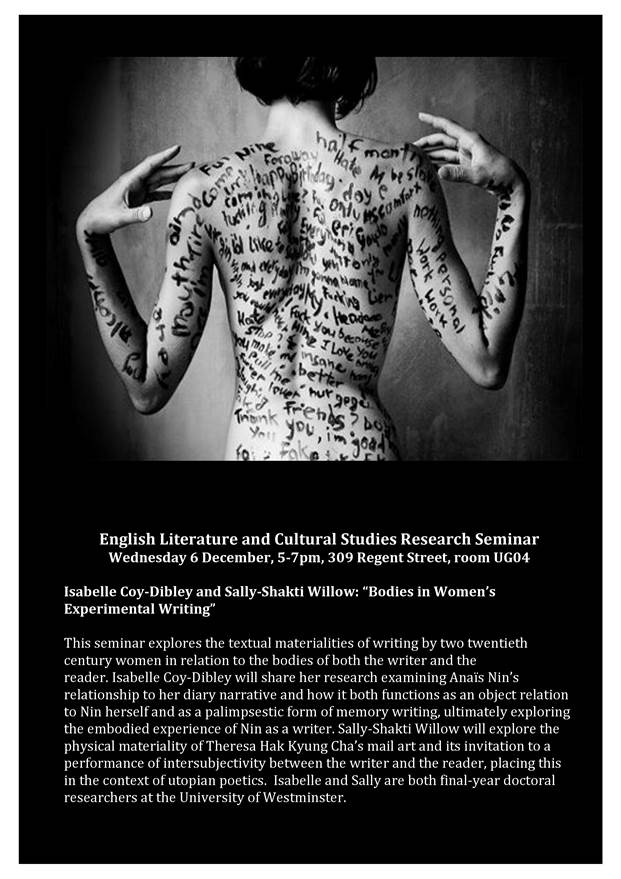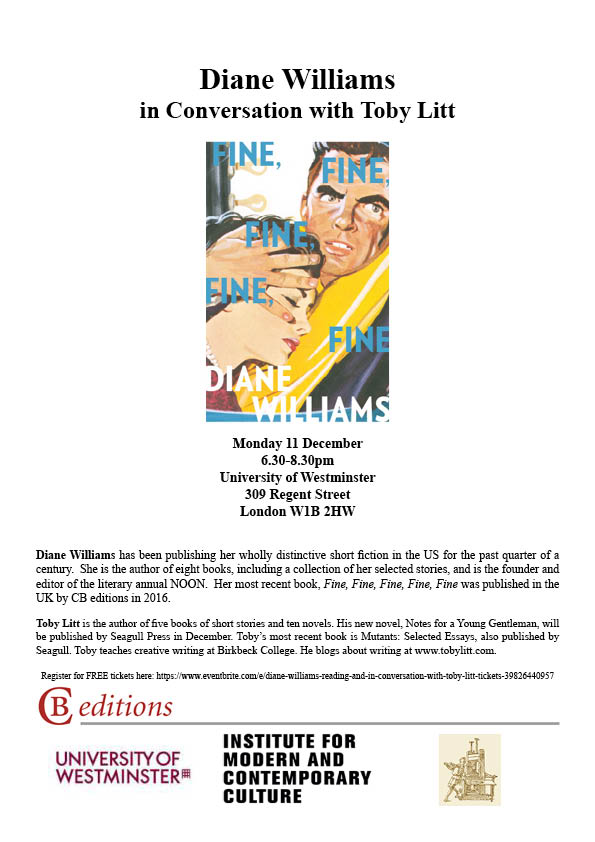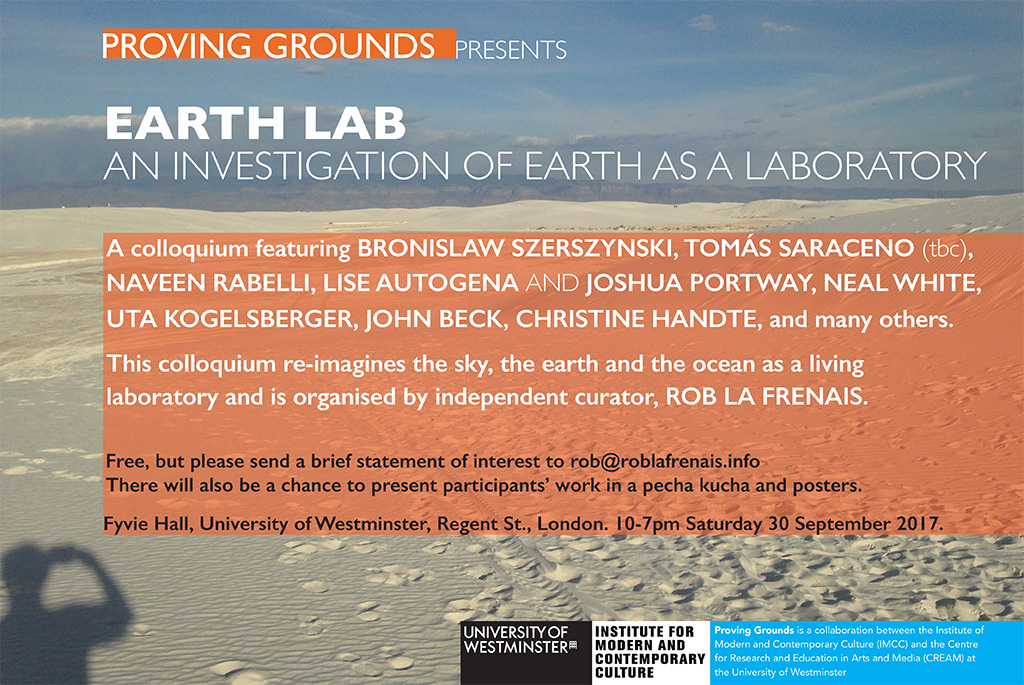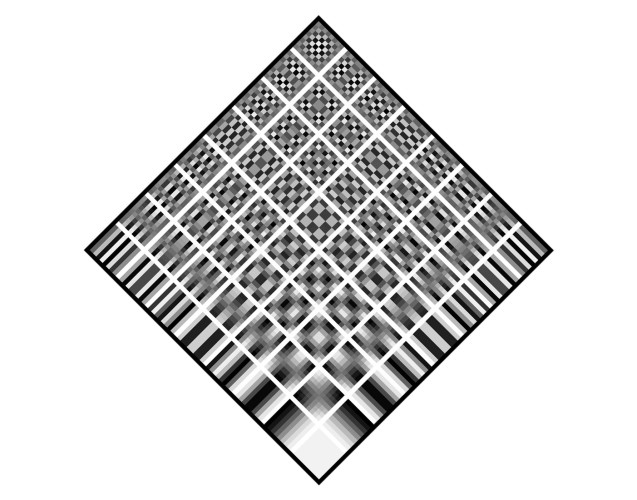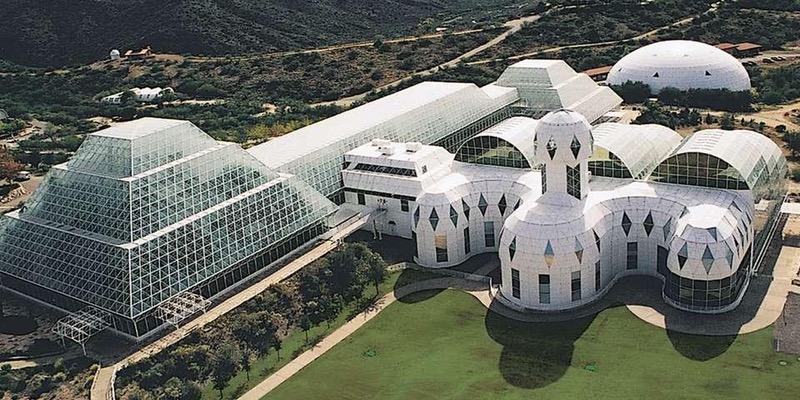Event
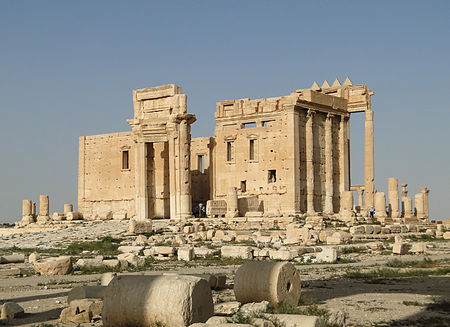
Friday 1st December 2017, 10.00 am – 3.00 pm
Westminster Forum, 5th Floor, University of Westminster, 32-38 Wells Street, London W1T 3UW
Nomos, Postcoloniality and Spatial Justice
Rory Rowan (University of Zurich), “A Neo-Colonial Nomos of the Earth?”
Peter Fitzpatrick (Kent), “Hidden Empires: Finding the Elusive space of Neo-Imperialism – and the Significance of Law”
Carrol Clarkson (University of Amsterdam), “Redrawing the Lines”
Part of the “Nomos, Postcoloniality and Spatial Justice” series of events organised by our friends in the Law and Theory Lab and funded by the British Academy Newton Advanced Fellowship Scheme. Further details from here. Or contact Julia Chryssostalis at J. Chryssostalis@Westminster.ac.uk
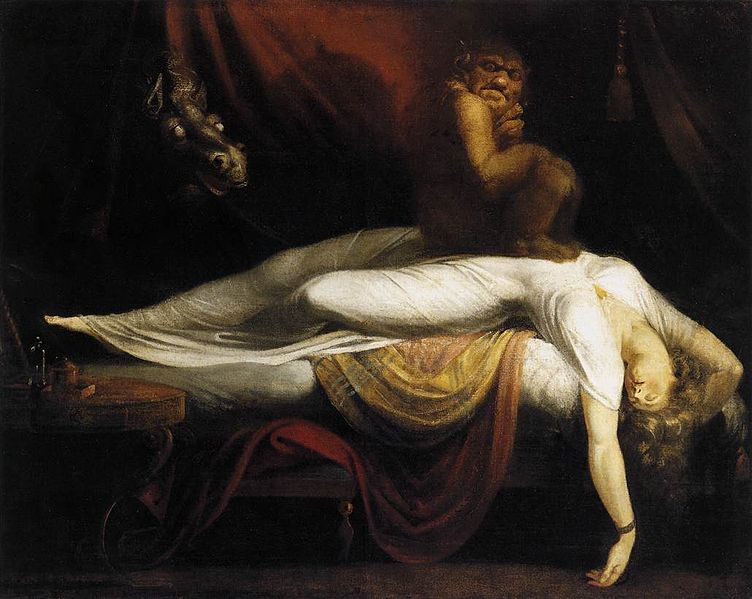
Wednesday 22nd November, 5.00 – 7.00 pm
Room 206, University of Westminster, 32-38 Wells Street, London W1T 3UW
The Ideals of Sleep: Victorian Sleep Research and Utopianism
Martin Willis (Cardiff)
We seem obsessed by the quality of our sleep in the twenty-first century, yet the high point of sleep research was the second half of the nineteenth century, and particularly the period from 1880-1900, when modern sleep studies began. For the Victorians, sleep was an active state (often linked to other cognitive pathologies and dissonances like catalepsy and epilepsy), which enabled or disabled certain functions of mind and body. How one slept was therefore of considerable interest to the general public as well as to physiologists, physicians and neurologists. Concurrent with this avid attention to the epistemologies of sleep, utopian fictions employed sleep as a foundation for asking questions of ideal lives and worlds. Often, other worlds were entered through the medium of sleep. This seminar will consider the connections between sleep and utopia, and ask whether sleep is itself an ideal place. It will do so by thinking not only about Victorian sleep, but about how contemporary sleep studies might inform our own ‘looking backwards’ to earlier scientific knowledge.
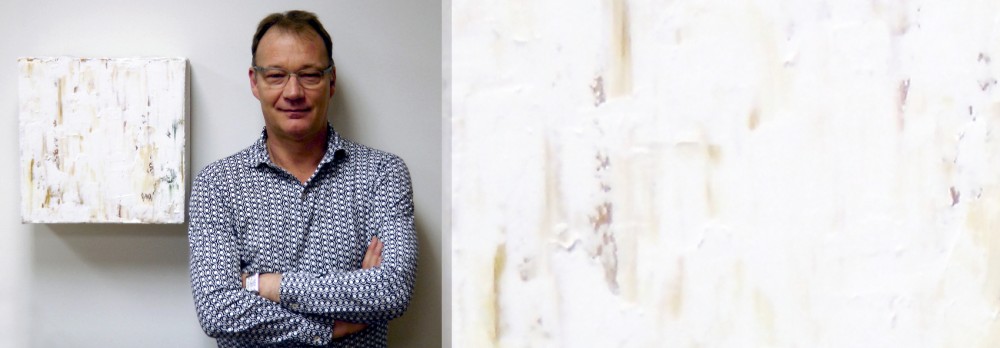
Friday 17th November, 6 – 8 pm
University of Westminster, 309 Regent Street, London W1B 2HW
Coming Out In/To Poetry
Professor Stephen Guy-Bray (University of British Columbia)
The Queer London Research Forum is hosting Stephen Guy-Bray for its first event this academic year. Professor Guy-Bray’s talk will address the idea that ‘[w]e all have coming out stories and we tend to think of them as personal and individual – our own property, our own history. But as we all have them, a coming out story can also be considered part of a vast communal project and, for poets, as a specifically literary project. In this talk Stephen Guy-Bray looks at two 20th-century poems (Luis Cernuda’s “Diré cómo nacisteis” and Adrienne Rich’s “A Valediction Forbidding Mourning”) and one 21st-century poem (Ocean Vuong’s “Someday I’ll Love Ocean Vuong”) in order to see how some poets have considered coming out as simultaneously personal and public.’
Stephen Guy-Bray is a specialist in Renaissance poetry and queer theory, with interests in poetics and in comparative literature. His publications include Against Reproduction: Where Renaissance Texts Come From (2009), Loving in Verse: Poetic Influence as Erotic (2006), and Homoerotic Space: The Poetics of Loss in Renaissance Literature (2002). Along with Joan Pong Linton and Steve Mentz he edited The Age of Thomas Nashe: Texts, Bodies and Trespasses of Authorship in Early Modern England (2013) and with Vin Nardizzi and Will Stockton, Queer Renaissance Historiography: Backward Gaze (2009)
Attendance is free but booking is mandatory, please register here: https://www.eventbrite.co.uk/e/coming-out-into-poetry-with-stephen-guy-bray-tickets-39191402540
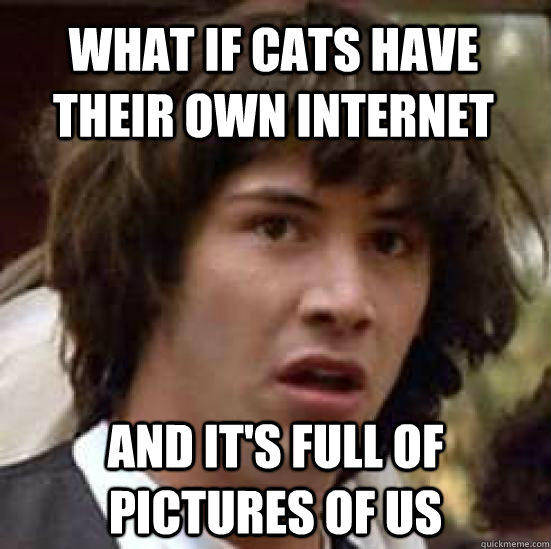
Wednesday 8th November, 5 – 7 pm
Room 206, University of Westminster, 32-38 Wells Street, London W1T 3UW
Digital Cultures: A Roundtable
Hosted by Westminster’s English Literature and Culture research series, and sponsored by the IMCC, this seminar will explore one of the most ubiquitous and at the same time elusive phenomena of contemporary culture: the experience of digitality.
Zara Dinnen is a Lecturer in Twentieth and Twenty-First Century Literature at Queen Mary, University of London and a founding executive committee member of the British Association of Contemporary Literary Studies. Her work focuses on representation of digital media in literary and popular culture. Her monograph, The Digital Banal, will be published by Columbia University Press in 2018.
Seb Franklin is a Lecturer in Contemporary Literature at King’s College London. His research includes literature, visual media, and media theory, especially histories of digital technology and cybernetics. He is the author of Control: Digitally as Cultural Logic (MIT Press, 2015).
Talita Jenman ran the Arts & Culture programme at ZSL London Zoo and has given talks at the National Gallery and Welcome Collection, among others, focusing on memetic culture and its relationship to animals. She is an alumna of MA Art and Visual Culture at Westminster.
Chaired by Kaja Marczewska (Westminster/IMCC)
All welcome – followed by drinks at the Green Man, Riding House Street.
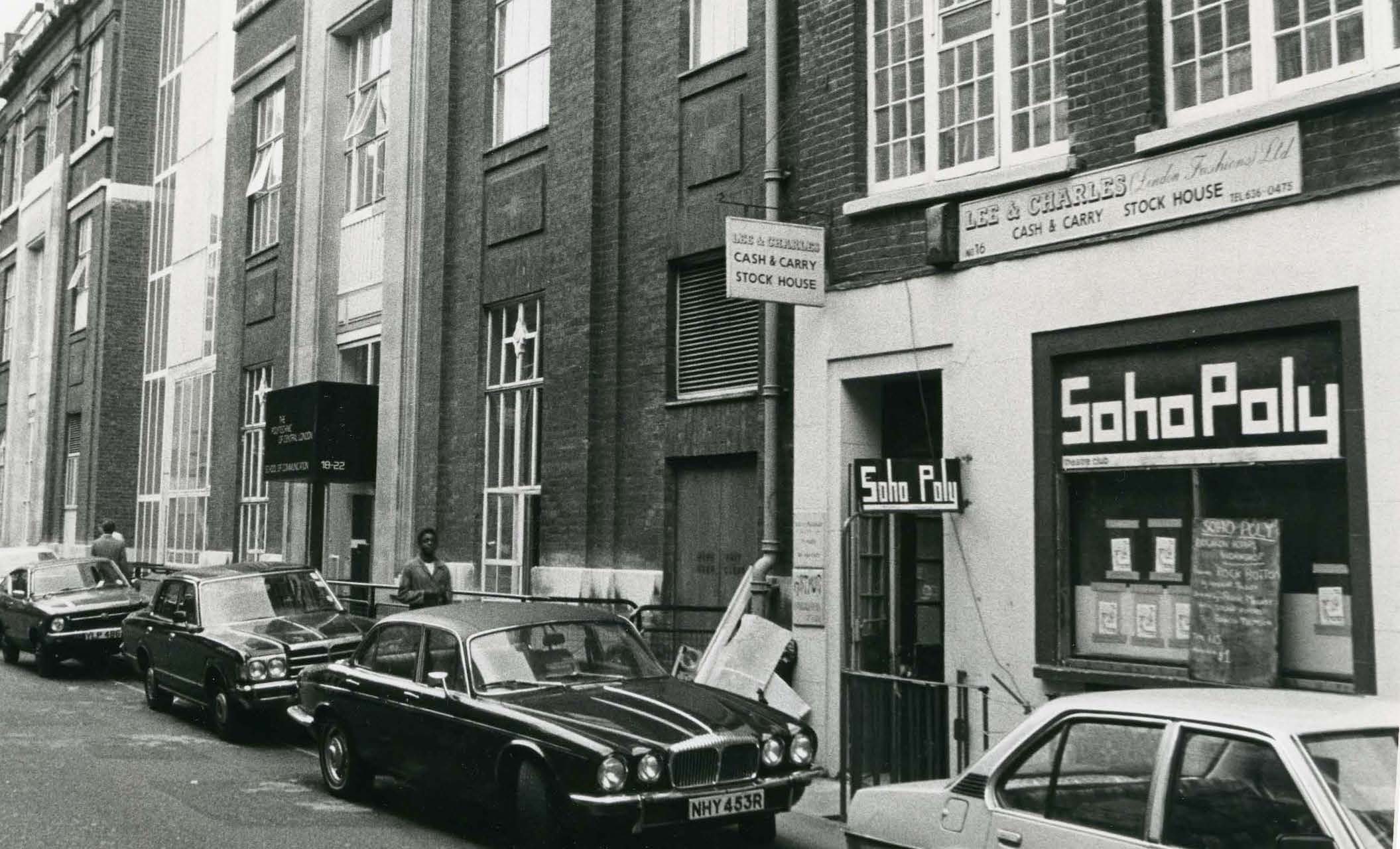
Monday 20th – Friday 24th November 2017
University of Westminster, 4-12 Little Titchfield Street London W1W 7BY
Found Theatre and Poetry: Disrupting the Everyday
As a part of the AHRC / British Academy funded Being Human Festival, the University of Westminster will be opening up London’s most important ‘lost’ theatre, the original Soho Poly Theatre, for the whole week beginning November 20th for visitors to come and see.
The Soho Poly Theatre – the radical forerunner of today’s Soho Theatre on Dean Street – operated out of a tiny basement room belonging to the University from 1972-1990. Many of the country’s best-known writers, actors, designers and directors worked here during this time. Curated by Guy Osborn and our own Matt Morrison, the project offers an opportunity to experience an exciting and varied series of events. Including a newly commissioned piece of digital theatre, live poetry readings and an exhibition of rare Nobby Clark photographs – all to be enjoyed in the specially reopened Soho Poly basement itself.
Tickets available from here
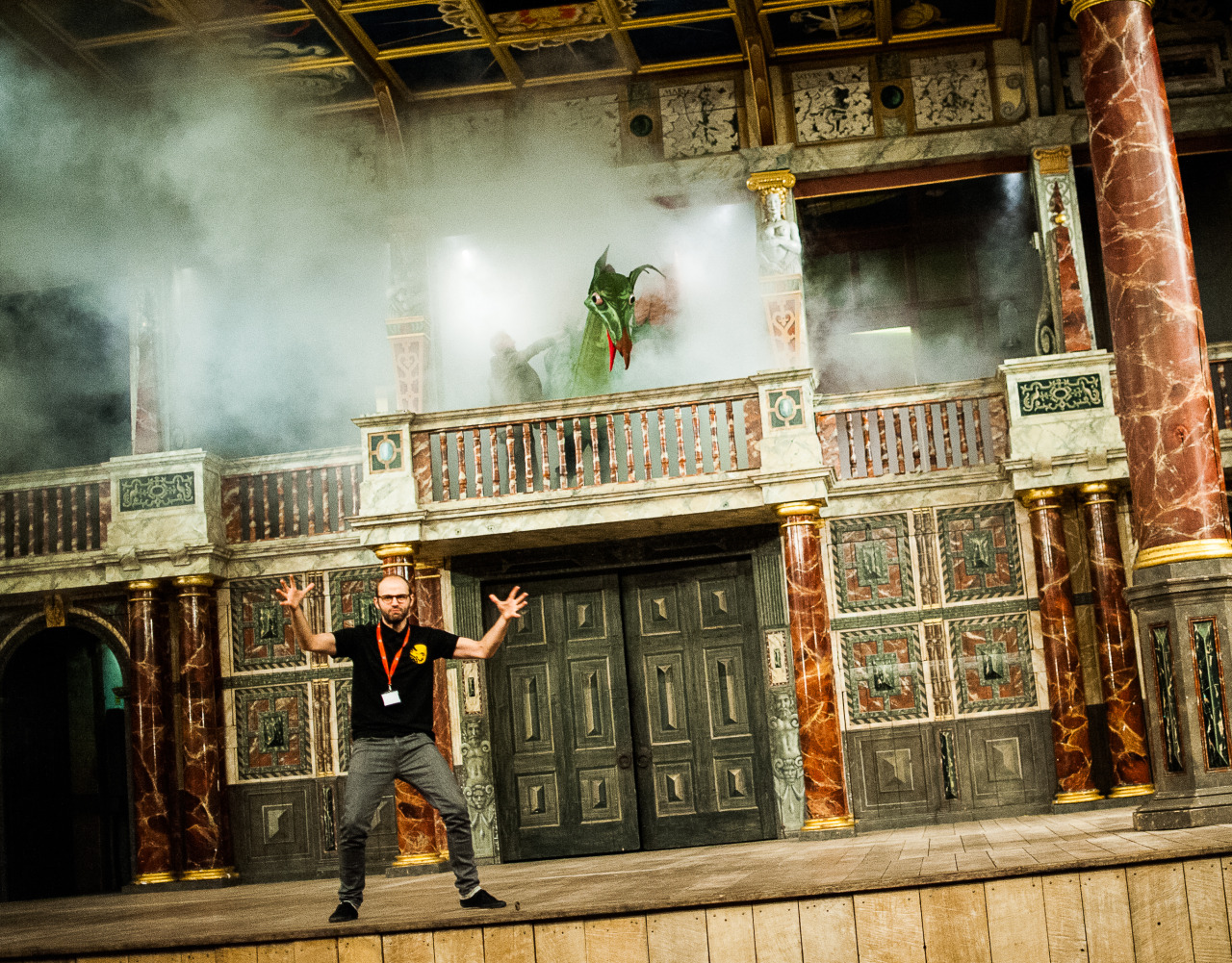
Wednesday 25th October, 5 – 7 pm
Room UG04, University of Westminster, 309 Regent Street, London W1B
Theatre and Performance: Tempestuous Technologies
Bringing together expert scholars and practitioners, this seminar examines the ways in which the use of technology can transform theatrical experience, for better and, perhaps, for worse. How do you conjure magic on a bare stage? Why did the use of special effects in the professional theatre recently cause a national controversy? How can digital technologies change the way we think about drama and production?
Leading Shakespeare scholar Dr Gwilym Jones talks about the development of early special effects in the Elizabethan theatre. Course leader for the Theatre Studies and English Literature BA and Theatre Studies and Creative Writing BA Dr Kate Graham discusses the outcry over the use of lighting and sound effects at Shakespeare’s Globe. Finally, Dramatist Dr Matthew Morrison will talk about the use of live streaming in his own theatre practice. Join us for an evening of discussion and debate about the relationship between technology and performance in theatres of the past, present and future.
This event is free and open to all students and staff at the University of Westminster – there is no need to book. Members of the public should email Matthew Charles at m.charles1@westminster.ac.uk to register.
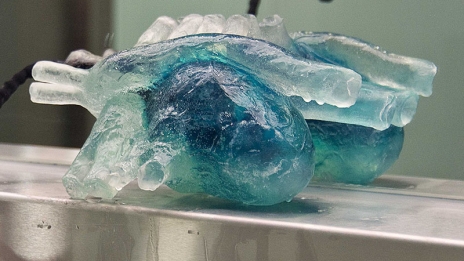
October 20th – November 16th 2017 (Private View: October 19th, 5-8 pm)
London Gallery West, University of Westminster, The Forum, Watford Road, Harrow, HA1 3TP
Hybrid Bodies
Ingrid Bachmann, Andrew Carnie, Alexa Wright
What does it mean to carry the heart of another person? Why do many heart transplants that appear clinically successful develop unexpected complications or fail? Hybrid Bodies is a multi-disciplinary research project, bringing together the arts, ethics, medicine and social sciences to investigate the complexities of heart transplantation. The project focuses on the lived experiences of heart transplant recipients, translating their stories into medical and academic literature as well as artworks.
Since 2007, artists Ingrid Bachmann, Andrew Carnie and the IMCC’s own Alexa Wright have been part of an international interdisciplinary team lead by Canadian cardiologist Dr Heather Ross and British philosopher Professor Margrit Shildrick. Uniquely for a collaborative project between artists and other specialists, the artists have worked in parallel with the scientists; exploring questions around the emotional, psychological and physiological experience of heart transplantation. The key research material is a collection of video interviews which reveal surprising levels of distress among post-transplant patients, strongly contradicting the belief that receiving a new heart is a simple solution to extending life.
Alexa Wright’s work explores the impact transplant can have on a recipient’s sense of self as a bounded and unique individual. In Heart of the Matter (2014), individual accounts of heart transplant are juxtaposed with personal narratives of lost loves and intimate relationships, forming a web of interconnected testimonies about the effects of a physical or emotional change of heart. Andrew Carnie is interested in how interconnections between different living systems can alter and extend a sense of self. A Change of Heart (2012) is a projected work based on drawings made while the artist listened to taped interviews with post-transplant patients and their analysis by social scientists. His constantly morphing figure captures a sense of everything in flux, in a continual state of becoming. Like the experience of transplant, Ingrid Bachmann’s A-part of Me (2014) is intensely physical, yet immaterial. Indicating both the challenges and benefits of empathetic listening, her sculptural listening device uses bone transducers to conduct sound to the inner ear using the skull as a resonating chamber, allowing participants to hear the narratives of the transplant recipients intimately, both in and through their body.
To find out more about this ongoing project and the people involved, visit www.hybridbodiesproject.com
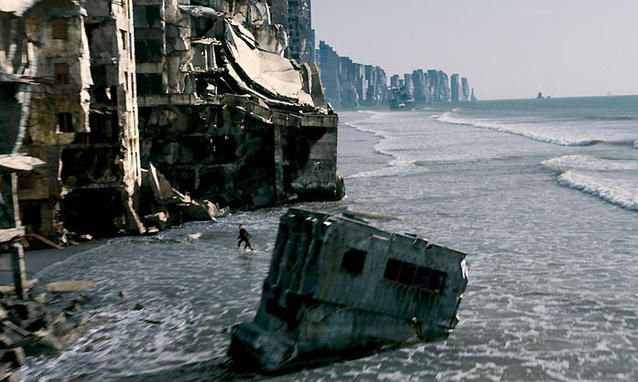
Wednesday 11th October, 5.00 – 7.00 pm
Room 206, University of Westminster, 32-38 Wells Street, London W1T 3UW
Should We Believe? The Fictional, the Virtual and the Real in the Contemporary Novel
Leigh Wilson (IMCC/University of Westminster)
Recent work from both novelists and literary critics has suggested that the contemporary novel is sick of fiction and has turned instead to the ‘real’. This paper questions this understanding of the contemporary novel and suggests instead that the most important representational model for the contemporary novel is the virtual. In establishing this, the article returns to both a history of the concept of the virtual and to Coleridge’s ‘willing suspension of disbelief’ in order to make visible the role of the virtual as a model for contemporary prose fiction.
All welcome! Followed by drinks in the Green Man …
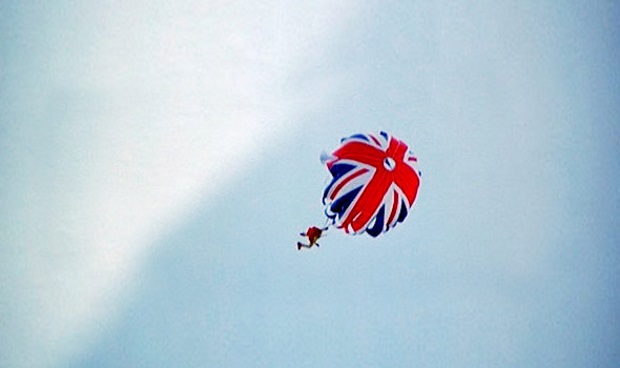
Thursday 12th October, 6.00 – 7.30 pm
City of Westminster Archives Centre, 10 St Ann’s Street, London SW1P
The Cultural Legacy and Popular Appeal of James Bond
Our own Monica Germana will be speaking on a panel organised by The Popular Literature and Culture Research Group at Roehampton University to celebrate the launch of the new International Journal of James Bond Studies.
Booking is essential. Telephone 020 7641 5180 or email archives@westminster.gov.uk
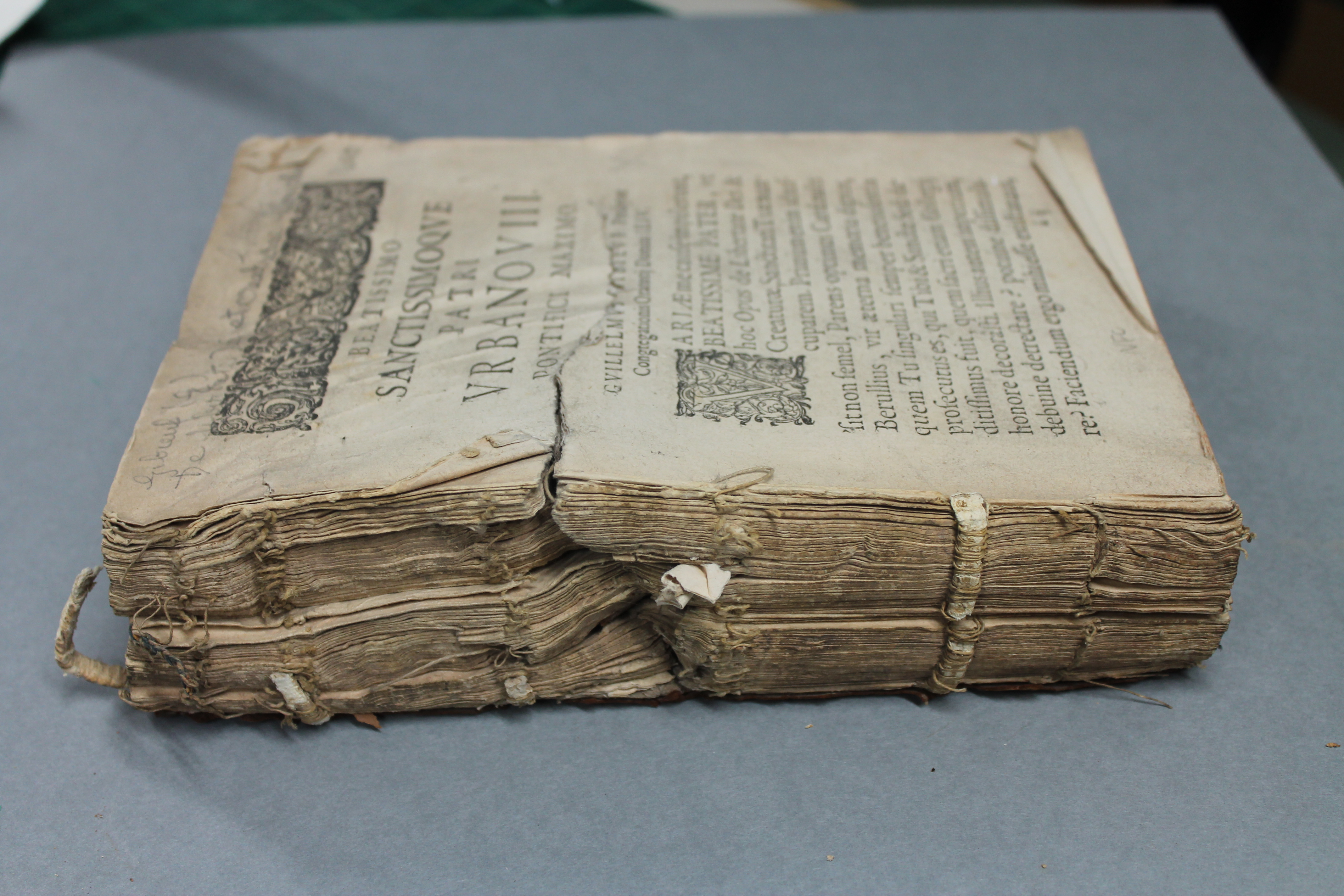
The English Literature and Cultural Studies Research Seminars hosted at the University of Westminster for 2017 are now confirmed, and there’s lots of IMCC involvement, with excellent papers about ongoing research by Leigh Wilson and Martin Willis and an exciting new series of panels organised by and for postgraduate and doctoral students. All welcome (although external visitors will need to sign-in at reception) and followed by the usual visit to the Green Man pub.
Wednesday 11 October, 5-7pm
Room 206, University of Westminster, Wells Street London W1T 3UW
Leigh Wilson (Westminster/IMCC)
“Should We Believe? The Fictional, the Virtual and the Real in the Contemporary Novel”
Wednesday 8 November, 5-7pm
Room 206, University of Westminster, Wells Street London W1T 3UW
Digital Cultures: Art, Literature and Archives roundtable
Chaired: Kaja Marczewska (Westminster/IMCC)
Wednesday 22 November, 5-7pm
Room 206, University of Westminster, Wells Street London W1T 3UW
Martin Willis (Cardiff)
“The Good Places of Sleep? Victorian Utopias, Sleep Research and Consumer Capitalism”
Wednesday 6 December, 5-7pm
Room UG04, University of Westminster, 309 Regent Street, London W1B 2HW
Materialisation of the Body in Experimental Writing roundtable
Organised by Isabelle Coy-Dibley and Sally-Shakti Willow (Westminster)

Thursday 19th October 2017, 5.30 – 7.30 pm
University of Westminster, 309 Regent Street, London W1B 2HW
Women, Writing and Freedom
Keynote talk by Maureen Freely, President of English PEN
In a masculine centred literary tradition that values male over female voices, women refuse to be silenced and continue to tell the truth about their personal and political lives. Join us in exploring the politics of silence and in honouring the voices of women writers everywhere who, despite repression and invisibility, risk all to give voice to the need for liberation and freedom.
Speakers: Maureen Freely, Hema Macherla, Avril Joy, Lynn Michell
Organised by The Contemporary Small Press project at Westminster in collaboration with Linen Press, a small, independent press run by women for women.
Saturday 30 September 2017, 10am-7pm
Fyvie Hall, University of Westminster, 309 Regent Street, London W1B 2HW
Earth Lab: An Investigation of Earth as a Laboratory
Organised by independent curator Rob La Frenais, this colloquium brings together a number of artists, inventors and thinkers who re-imagine Earth, sea and sky from a bottom-up, post-anthropocene position, in a wide-ranging, broad-brushtroke survey of current thinking about Earth as a living laboratory. The speakers consider the sky, the oceans and the land to pursue a number of themes that investigate social and artistic approaches to scientific knowledge in a rapidly changing world. Featuring Bronislaw Szerszynski, Tomás Saraceno, Nicola Triscott, Naveen Rabelli, Rob La Frenais, Jennifer Gabrys, Lise Autogena, Joshua Portway, Carlos López Galviz, Uta Kogelsberger, John Beck, Christine Handte, Neal White and chaired by Lucy Reynolds.
Admission to the Colloquium is free. Please register here.
There will be the opportunity for participation in a selected pecha kucha and poster session over drinks. Please send a 100 word statement of intent to Rob at rob@roblafrenais.info if you would like to be considered for a pecha kucha or poster. More details here.
This event is part of Proving Grounds, a series of workshops and events led by John Beck at IMCC and Neal White at the Centre for Research and Education in Arts and Media (CREAM), University of Westminster. The aim of the series is to critically engage with issues of inter- and trans-disciplinarity in relation to speculative, hypothetical or experimental research at the intersections of the arts, humanities and sciences.
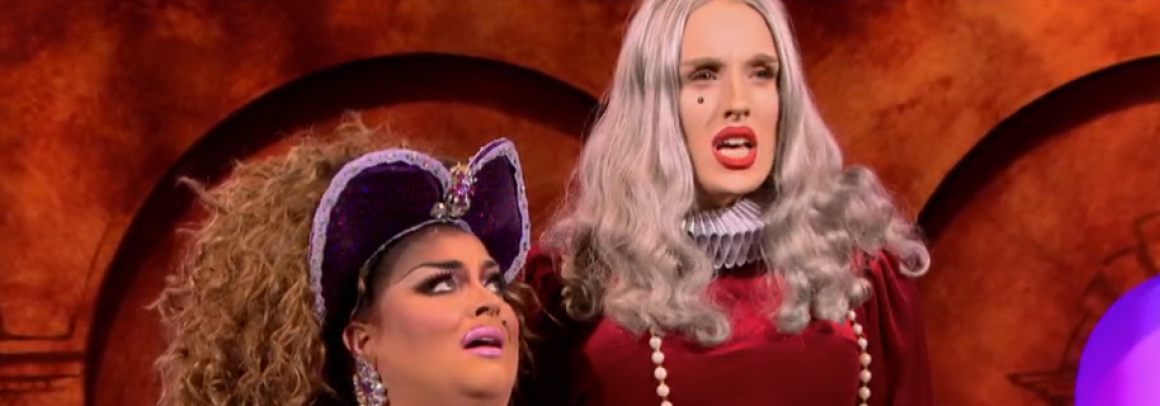
Friday 7th & Saturday 8th July
University of Westminster, 309 Regent Street, London W1B 2HW
“Show thy queere substance”: The Queer, the Early Modern and the Now
Hosted by our friends in the Queer London Research Forum at Westminster, a one-day symposium which seeks to consider two questions: firstly, what can queer frames tell us about Early Modern texts and contexts? Secondly, in what ways can the Early Modern (be it literature, culture or politics) speak to queer cultures in the present? Or, what do queer reiterations of Early Modern texts and contexts achieve in the present?
The conference begins on Friday 7th July at 5:30pm (in the Cayley Room in the 309 Regent Street building) when Andy Kesson is going to run a performance workshop, titled ‘Playing Queerness’, which showcases the work he’s been doing with director Emma Frankland, as part of the Before Shakespeare project, on John Lyly’s Galatea. The workshop will be followed by a wine reception in the foyer.
The programme for the papers on Saturday can be found at:
https://showthyqueeresubstance.wordpress.com/saturday-8th-june/
Attendance is free, but registration is required. You can register for the conference here.
May 24, 2017, 7pm
Carroll / Fletcher, 56-57 Eastcastle Street, London W1W 8EQ
£5 tickets available here.
How Did the Computer Learn to See?
Alexander Galloway
How did the computer learn to see? A common response to the question is that the computer learned to see from cinema and photography, that is, from modernity’s most highly evolved technologies of vision. In this talk Alexander Galloway will explore a different response to the question: the computer learned to see not from cinema but from sculpture. With reference to the work of contemporary artists, along with techniques for digital image compression, we will explore the uniquely computational way of seeing the world.
This event is organised by IMCC in collaboration with Carroll / Fletcher. It will feature as part of a Critical Digital Humanities project run by the Department of English, Linguistics and Cultural Studies at the University of Westminster and Dartmouth College, USA, funded by the British Academy.
Alexander R. Galloway is a writer and computer programmer working on issues in philosophy, technology, and theories of mediation. He is author of several books, most recently a monograph on the work of François Laruelle, and is a professor in the Department of Media, Culture, and Communication at New York University.
For more information, please contact Kaja Marczewska: k.marczewska@westmister.ac.uk
Friday May 19th, 6pm
University of Westminster, 309 Regent Street, London W1B 2HW, Room UG04
Free admission, but please book here as space is limited.
Kathelin Gray, Biosphere 2 co-founder, in conversation with Dr Rob La Frenais, independent curator
Biosphere 2 was a massive project in the Arizona desert which, in 1991-94, completely enclosed 2 teams of humans, animals and plant life in a closed, sealed environment, creating laboratory conditions to study interactions in a biospheric system, to better understand global ecology, and as a spinoff, towards bio-regenerative conditions in space travel. When Biosphere 2 closed its doors in September 1991 for a two-year experiment in closed systems living and experimental ecology, it was, as it remains, years ahead of its time. The antagonisms which led to the termination of the Biosphere 2 experiment, in 1994, seem all the more absurd in retrospect, particularly in respect of the then involvement of Steve Bannon, now in the Trump administration.
Kathelin Gray who was involved throughout the experiments, says: “ It is ironic that with the reopening of the ‘space race’ to Mars, this work is now being re-examined and in some cases re-invented. The passage of time shows just how important this work was. We need to revisit ways in which we can demonstrate our impact on the ecology and the complex inter-relationships which make human existence on earth possible yet so fragile to our own impacts. Physiologically, culturally and chemically we are all earthlings. Our fate is indissolubly linked with the health of our fellow earthlings: microbes, soils, plants, animals, a concept that was once considered alternative thinking”.
There is still considerable debate about the continuing resonances of the largest project of this type that has ever taken place in the world. Much scientific knowledge was gained from Biosphere 2, despite controversy at the time. What was equally important was that it was also an art-science project, with the Institute of Ecotechnics as scientific coordinator. ‘Theatre of All Possibilities’ and ‘Theatre for the Reconstitution of Reality’ partnered in the experiment, bringing in an ongoing radical cultural experiment taking place inside Biosphere 2, “redefining performative architecture and the role of historical innovation on the world stage” (Gray). This collective, collaborative initiative has established multidisciplinary projects still ongoing worldwide, based in different ecosystems, with the Institute of Ecotechnics.
Rob La Frenais, curator of The Arts Catalyst for 17 years, founder editor of Performance Magazine and now an independent curator, himself visited and interviewed the Biospherians through the glass in the 90’s and will engage Kathelin Gray in a lively and provocative conversation about the legacy of Biosphere 2.
This event marks the launch of Proving Grounds, a new series of workshops and events organised by IMCC and the Centre for Research and Education in Arts and Media (CREAM) at the University of Westminster. The aim of the series is to critically engage with issues of inter- and trans-disciplinarity in relation to speculative, hypothetical or experimental research at the intersections of the arts, humanities and sciences. More information about Proving Grounds will be available at the event.
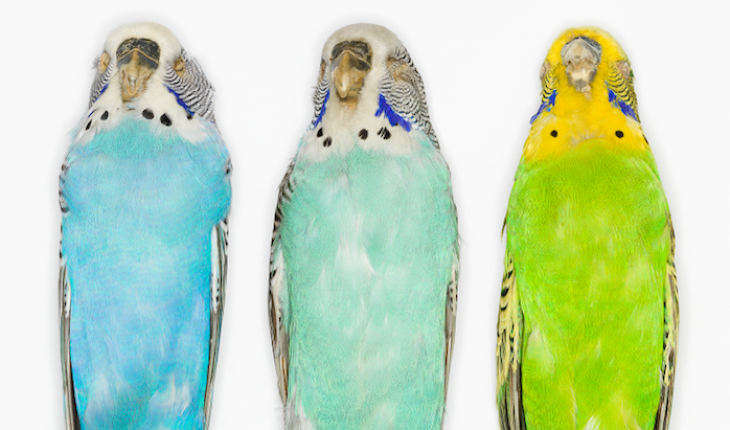
Thursday 1th May, 6.00 – 6.45 pm
Wellcome Collection, 183 Euston Road, London NW1
Making Nature: How We See Animals walking tour
Our former MA student Talita Jenman is leading a special tour of the Wellcome Collection exhibition ‘Making Nature: How we see animals‘. Talita ran the Arts & Culture programme at ZSL London Zoo before taking her MA in Art and Visual Culture. She has previously given talks at the National Gallery on artists and animals and wrote her dissertation on animals and their representation on social media.
There is no need to book (though spaces are limited). Just meet your guide beside the Information Point on level 0. Further details here.
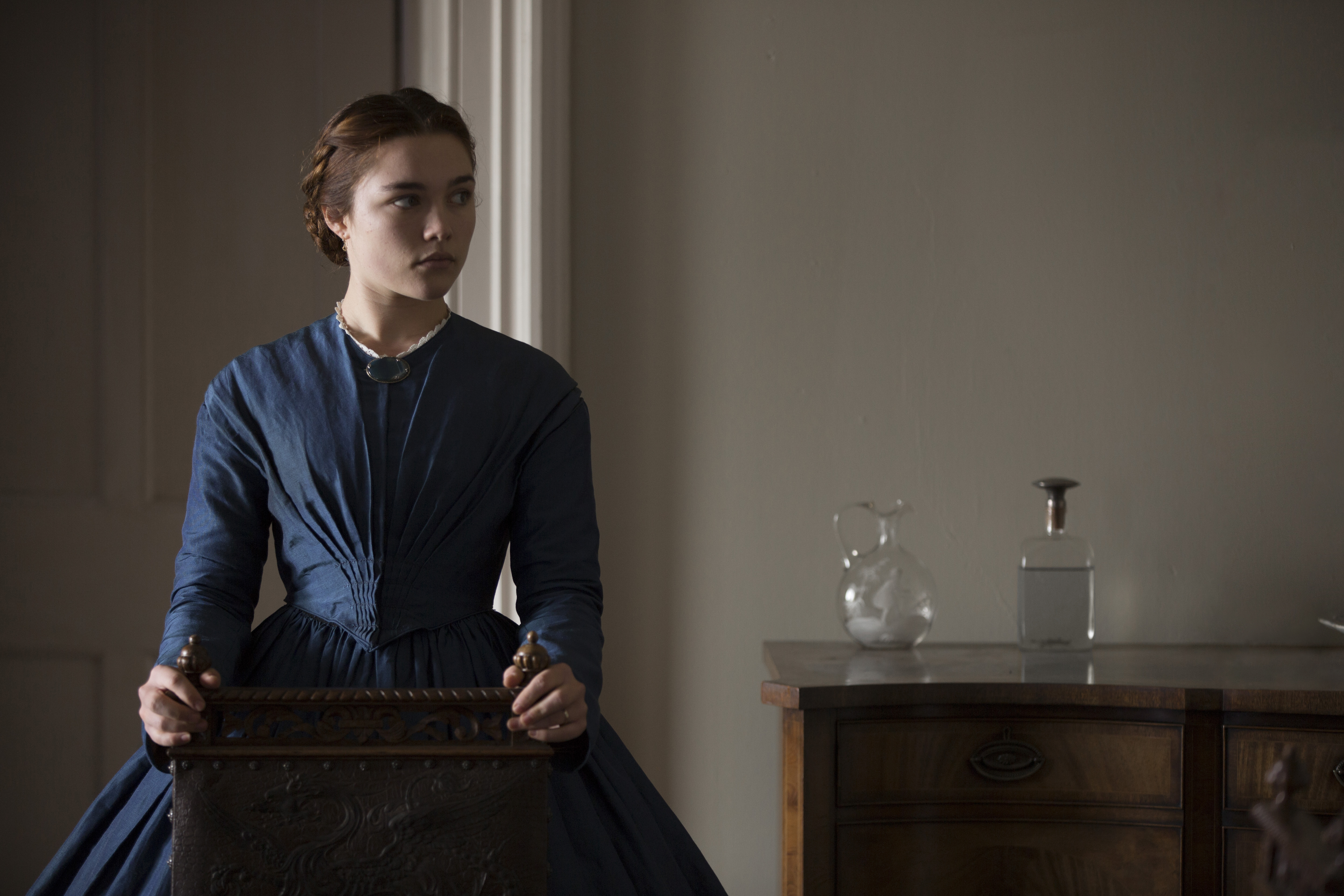
Our colleague Monica Germanà will be taking part in a panel discussion following a showing of the new film Lady Macbeth organised by Birds Eye View at the Soho Curzon on Thursday 25th April at 6.30pm. Other panellists include actor Florence Pugh, Alice Birch (Writer), Empire Magazine’s Terri White, The Debrief’s Sophie Wilkinson and Dr. Kaja Franck.
Lady Macbeth is directed by William Oldroyd and is based upon the novel by Nikolai Leskov. Birds Eye View is a non-profit organisation established in 2002, which is dedicated to turning up the volume of the female voice in film through “action!” not just words.
Find out more and book tickets here.
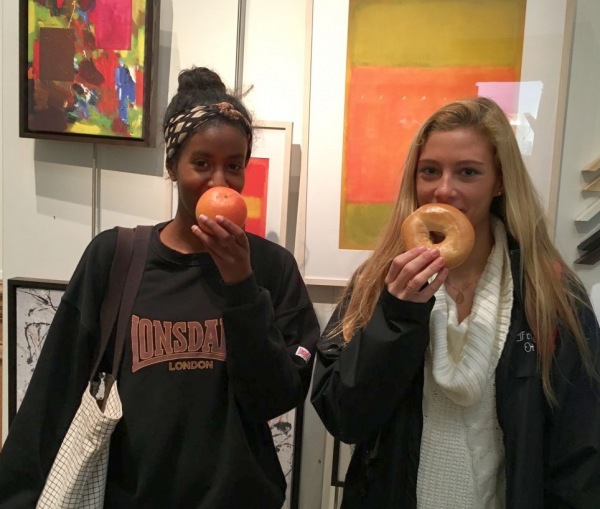
April 27-30 2017
Tate Exchange, Tate Modern, London
Tasty & Smelly: A different way to connect to art
Could appreciating art have more in common with savouring a cup of coffee than you thought? Could our senses of taste and smell help define who we are?
Taste and smell give us a nuanced sense of what we like and are powerfully linked to emotions and memories. Just the hint of a smell can take us back to another time and place. The tang of something on your tongue can unravel thoughts and associations. Some aspects of taste and smell are things always we carry with us and others are things we acquire over time. They can reflect our individuality and our cultural backgrounds. They reveal how we grow through our changing circumstances, histories and journeys across the globe. In Tasty & Smelly you are invited to play, explore and experiment with your senses of taste and smell, and discover how they shape your sensory world, individually and collectively. From designing multi-sensory labels for artworks, creating teas that respond to the architecture of the building, chilling out in a scented mediation pod to re-organising the Tate collection by spicyness, these events and installations encourage you to playfully engage with taste and smell and the associations that they create.
Produced by students and graduates from our MA programmes at the University of Westminster the activities aim to tease out some of the many ways we carry our tastes, preferences and cultural histories with us when we enter into an art museum. Plus, through interactive demonstrations and hands-on experiments presented by researchers from the Centre for Experimental Aesthetics, Technology and Engineering, University of London, you can discover the unexpected strategies your brain uses to make and share matters of taste, from the most sensory ones to the art-world.
To register for one of the workshops or activities or to find out more email: tastyandsmellyevent@gmail.com Or see: https://www.facebook.com/tastyandsmelly/


The Institute for Modern and Contemporary Culture
University of Westminster Department of English, Linguistics and Cultural Studies
32-38 Wells Street, London W1T 3UW. United Kingdom.

